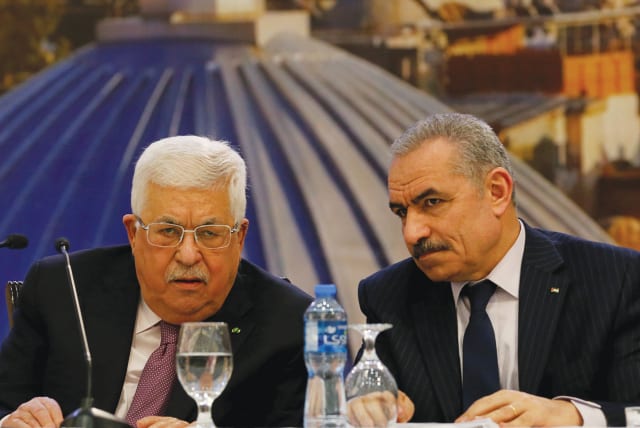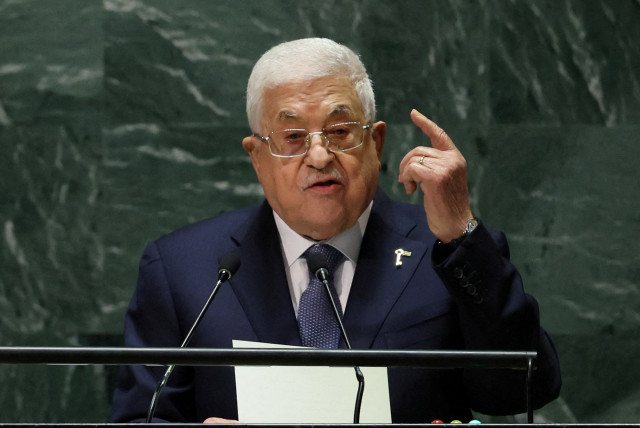Palestinian Prime Minister Shtayyeh resigns from position

Shtayyeh, a member of ruling party Fatah's Central Committee, has been Palestinian prime minister since 2019.
Palestinian Prime Minister Mohammad Shtayyeh submitted his resignation to Palestinian President Mahmoud Abbas on Monday, amid growing US pressure on Abbas to shake up the PA as international efforts have intensified to stop the fighting in Gaza and begin work on a political structure to govern the enclave after the war.
Abbas accepted Shtayyeh’s resignation and asked him to stay on as caretaker until a permanent replacement is appointed.
Shatyyeh said that “the next step is the need for a new arrangement that will ensure [Palestinian] unity.
“We will remain in conflict with Israel until the establishment of a Palestinian State,” he added.
The Palestinian Authority, created 30 years ago as part of the interim Oslo peace accords, has been badly undermined by accusations of ineffectiveness and corruption. The prime minister holds little effective power.
But Shtayyeh’s departure marks a symbolic shift that underlines Abbas’s determination to ensure the Authority maintains its claim to leadership as international pressure grows for a revival of efforts to create a Palestinian state alongside Israel.
Shtayyeh, a member of ruling party Fatah’s Central Committee, has been prime minister since 2019.
Hamas involvement
Shtayyeh said on Monday he was resigning to allow for the formation of a broad consensus among Palestinians about political arrangements following Israel’s war against Hamas in Gaza.
A senior Hamas official said the move had to be followed by a broader agreement on governance for the Palestinians.“The resignation of Shtayyeh’s government only makes sense if it comes within the context of national consensus on arrangements for the next phase,” senior Hamas official Sami Abu Zuhri told Reuters.
“Mohammed Shtayyeh will step down from the prime minister position, and [Mahmoud] Abbas will appoint someone even more corrupt,” a Hamas source told Saudi state-owned news outlet Al Arabiya on Sunday.
According to the source, Hamas’s goal is to form an impartial and national government that is formed by consensus of the Palestinian factions, adding that the upcoming talks in Moscow to build a unity government would only be in place for “a specified period.”
The unity talks in Moscow are scheduled to take place on Monday.
No successor has been appointed but Abbas is widely expected to name Mohammad Mustafa, a former World Bank official who is chairman of the Palestine Investment Fund (PIF) with experience of rebuilding Gaza after a previous war in 2014. There has been no word on elections, which have not been held since 2006.
The Palestinian Authority exercises limited governance over parts of the West Bank but lost power in Gaza following a factional struggle with Hamas in 2007.
It has been badly weakened over the years and surveys show it is deeply unpopular among Palestinians. But it remains the only leadership body generally recognized by the international community.
Reuters and Sam Halpern contributed to this report.
Jerusalem Post Store
`; document.getElementById("linkPremium").innerHTML = cont; var divWithLink = document.getElementById("premium-link"); if (divWithLink !== null && divWithLink !== 'undefined') { divWithLink.style.border = "solid 1px #cb0f3e"; divWithLink.style.textAlign = "center"; divWithLink.style.marginBottom = "15px"; divWithLink.style.marginTop = "15px"; divWithLink.style.width = "100%"; divWithLink.style.backgroundColor = "#122952"; divWithLink.style.color = "#ffffff"; divWithLink.style.lineHeight = "1.5"; } } (function (v, i) { });

